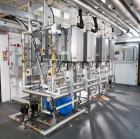Rinnai’s Infinity range covers all DHW options

Rinnai’s comprehensive range of Infinity continuous-flow water heaters is designed to offer a blend of eco-friendly technologies to provide a constant flow of hot water, no matter how high the demand or how many outlets are in use at the same time. This commercial range includes heavy-duty (HD) and heavy-duty condensing (HDC) units, as well as the Infinity Plus custom-made solution that brings together multiple units from the HDC range in single modules, and the Infinity Plus storage options.
The HD50I internal wall-hung gas-fired water heater can deliver 770 l/h through a temperature rise of 50 K. Incoming water temperatures of up to 65°C are accepted, making this unit suitable for secondary return and renewables pre-feed systems.
The HD70E can be installed outdoors and deliver up to 979 l/h at a 50 K rise. The HDC range can deliver nearly 1000 l/h through a 50 K rise. This range is renewables ready and compliant with future regulatory proposals.
The Infinity Plus system incorporates water heaters, skid systems with cable trays, pipework and electrical connectors to provide a complete prefabricated turnkey solution that requires only final connections to the associated services.
The Infinity Plus Storage system provides a cost-effective solution for high water use where gas provision may be problematic.







